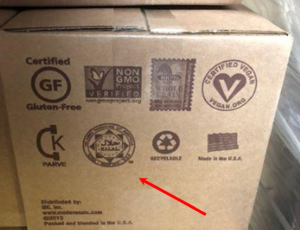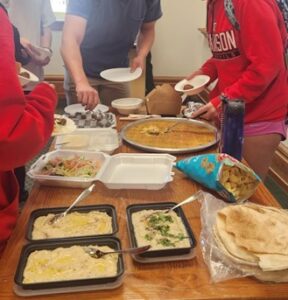Just as the food we eat communicates our relationship with our environment, it communicates a relationship with our culture as well. And for many, religion helps guide what that communication looks like. This blog post aims to introduce and question the integration of Halal food practices with the globalization and industrialization of food systems. More questions to be asked include localized Muslim food practices and food with regards to Holydays in Islam.
الغرآن (the Quran) is the main holy text that shapes and dictates how Muslims should shape their lives in submission to Allah (God). The Quran dictates God’s word in one way by categorization. The two main categories are حرام (Haram) which regards prohibited actions and حلال (Halal) which regards permissible actions (M. Abu Shuleh, personal communication, October 24, 2024). According to the Quran regarding food, it is haram to consume non humanely slaughtered animals, pork & pork byproducts, fanged beasts of prey, birds with talons, blood, animals that eat feces, anything stolen or procured in haram ways, any intoxicants like alcohol, and anything devoted to one other than Allah (M. Abu Shuleh, personal communication, October 24, 2024). Yet despite these specificities, Muslim communities vary greatly in interpretation and subsequent practice of these guidelines. As Maris Gillette (2015) discusses in her chapter on Muslim foodways, “Many Muslims believe whether or not a food is good to eat depends as much, or more, on who, how and where as on what” (p.59).

https://www.isahalal.com/news-events/blog/3-reasons-why-you-need-halal-mark-your-product-packaging
Through economic globalization of food systems, for non-Muslim or Muslim majority countries, “halal” has transformed into referring specifically to food restrictions. It can be seen across food packaging among labels like “Vegan” or “Cage-free”. This trend of halalization can be linked to delocalization of Muslim foodways (Gillette, 2015). When a Muslim community becomes detached from the food production process, it becomes harder to scrutinize food beyond the ingredients it contains. For example, ذبيحة (zabiha, sacrifice) refers to the halal conditions of meat procurement for food. This is a particular method of slaughter that aims to minimize the animal’s suffering and ensure devotion to Allah. Organizations like the World Halal Council work with the agribusiness industry to standardize halal certification including things like zabiha (M. Abu Shuleh, personal communication, October 24, 2024).

Hala Food. Photo courtesy of Samantha Mouyard
Some questions arose during the lecture by Professor Mohammad to the Introduction to Food Studies class. What does the Quran advise regarding pre-slaughter animal practices? Large-scale farming industries are increasingly being scrutinized by the general public for ethical practices in livestock rearing. Labels like “cage-free” and “humanely raised” have proven unstandardized, as we have discussed in class. Professor Mohammad answered in part that ethical practices go as far as how they would impact the end product. For example, the Quran bids it haram to eat any animal that consumes feces. So if an industrial chicken farm limited space for their chickens so much as their feces would get mixed up in their feed, that chicken would then be haram.
In summary, the Quran dictates many aspects of food practices, including in production and consumption limitations. But as food system practices have shifted, questions continue to arise for Muslims seeking to honor Allah in their personal, cultural, and systematic food practices.
References
Gillette, M. (2015). Muslim Foodways. In J.A. Klein and J.L. Watson (Eds.), The Handbook of Food and Anthropology (pp. 48-73). Bloomsbury Publishing.